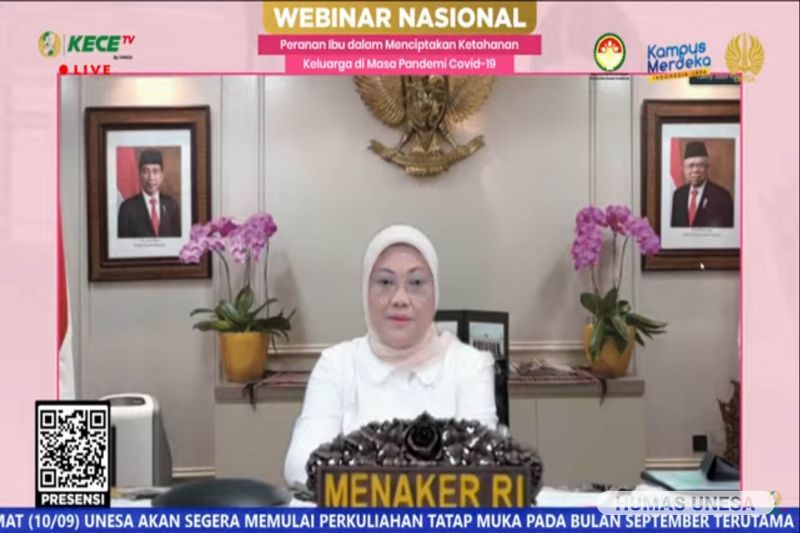
www.unesa.ac.id
Unesa.ac.id, SURABAYA–Dharma Wanita Persatuan (DWP) Universitas Negeri Surabaya held a national webinar with the theme "The Role of Mothers in Creating Family Resilience in the Time of the Covid-19 Pandemic" on Thursday (16/09/2021). Dr. Dra. Hj. Ida Fauziyah, M.Sc., Minister of Manpower of the Republic of Indonesia (Menaker RI) was present as Keynote Speaker. In addition, three resource persons were also present, namely Arzeti Bilbina Huzaimi, S.E., M.Ap, as Member of the Indonesian House of Representatives Commission IX., Chusnur Ismiati Hendro Gunawan, Chairperson of Dharma Wanita Surabaya City, and Dr. Diana Rahmasari S.Psi., M. Si., Head of SMCC UNESA.
The event was opened by the Chancellor of UNESA Prof. Dr. Nurhasan, M.Kes. The man who is usually called Cak Hasan said that women have an important role in all lines. There are at least five important roles for women, namely psychological, economic, social, physical, and ecological. "To talk about women is to talk about the nation. Family resilience is part of the nation's resilience," he said.
Ida Fauziyah on that occasion said that the Covid-19 pandemic had a major impact on the country's economy and had a major impact on the labor sector. He said, there was a significant increase in the number of unemployed in Indonesia due to the Covid-19 pandemic. BPS data for 2020-2021, the largest increase in unemployment occurred in young people aged 20-29 years.
Meanwhile, the open unemployment rate for residents aged 20-24 years was 17.66 percent in February 2021, an increase of 3.36 percent from the same period the previous year. Then the unemployment population aged 25-29 years was 9.27 percent and increased by 2.26 percent from the previous year.
He continued, the data on the number of unemployed women was lower than that of men. However, several studies show that women are actually feeling the biggest impact from the pandemic. "This is a challenge to empower women in the world of work," she said. Then, other challenges, (1) the level of participation of the female workforce, (2) wage discrimination, (3) the lack of fulfillment of rights in the workplace, (4) harassment and violence in the workplace, and (5) the stigma that women are less productive. , and become a burden at work.
Even in the household, women have the burden, (1) taking care of the household due to WFH, (2) the burden of taking care of and controlling children who learn from home, (3) domestic violence, (4) the economy is vulnerable to causing anxiety. These are all indicators of family vulnerability that can result in a family resilience crisis. "To support family resilience, women must be empowered and work, and continue to improve competence and productivity by utilizing digital technology," he concluded.
Chairperson of the UNESA DWP, Dra. Hj. Endah Purnomowati Nurhasan, M.Pd., explained that the Covid-19 pandemic created various anxiety in the family. The data shows that the most important anxiety is anxiety about being exposed to Covid-19 by 77.7% and anxiety about economic conditions by 57.7%. However, he said, citing the results of a survey by Euis Sunarti, who found that most families were confident in their ability to rise from all disruptions caused by Covid-19.
Arzeti Bilbina explained that in the community structure, the family has the function of preventing and handling Covid-19 at home and its surroundings, such as being the main educator for children, instilling a frugal lifestyle, caring for health and cleanliness in their respective environments and being aware of unwanted pregnancies. . “Self-discipline is the main thing to be able to survive in this pandemic era. and this discipline can be started from a small scope, the family,” he said.
Chusnur Ismiati Hendro Gunawan explained that women have the potential and have a central role in the family, both as mothers, wives and independent individuals who are obliged to strengthen family resilience during the COVID-19 pandemic. Women must continue to be encouraged to be creative. That is one of the tasks of the UNESA DWP.
Diana Rahmasari said that there were several challenges faced by the community during the pandemic, including personal and family psychological pressure, reduced economic livelihoods, future uncertainty, limited personal psychological space due to sharing pressure while staying at home, family conditions and relationships between family members.
He likens a happy and prosperous family to a solid building. The strength of a building depends on a strong and deep foundation. Well, the foundation in the family is the principle that is held by all families, namely the principle of justice, mutual or mutual give and take, and the principle of balance between rights and obligations. "Family resilience is the duty and responsibility of all family members and certainly needs to be encouraged by all elements of the government, central to regional, because that is the mandate of the law," he said. (wulida)
Share It On:






